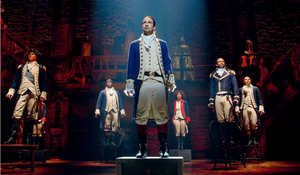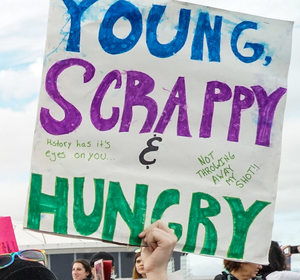Student Blog: How Hamilton Transcends Musical Theater
If you can, I highly recommend seeing this revolutionary musical about a revolutionary time and a revolutionary man.

After seeing Hamilton, Michelle Obama stated that the musical is "the best piece of art in any form that I have ever seen in my life." Hamilton, the rap musical about founding father Alexander Hamilton which won 11 Tony Awards, a Grammy, an Emmy, and a Pulitzer Prize, isn't your typical Broadway musical. I will even go as far as to argue that Hamilton isn't just a musical about history but changed history both on Broadway and in the United States.
One way Hamilton is different from typical Broadway musicals is because its music transcended Broadway. When Hamilton (Original Broadway Cast Recording) was released on September 25, 2015, it wasn't just the number one Broadway album on Billboard's website, it peaked at the number one spot on Billboard's top rap albums. At the end of 2015, Billboard listed Hamilton as the second-best album of the year.
When Hamilton was released on Disney+ in July 2020, it was ranked the second-best ranked album on the Billboard 200 list, which ranks the most popular albums of the week. This ranking came on the 250th straight week Hamilton was on the Billboard 200.
Another reason Hamilton is different from other musicals is that it's a story about white people portrayed by actors who are not white. It's no secret that Broadway, meaning its performers and patrons, is overwhelmingly white. According to the Asian American Performers Action Coalition, in the seven Broadway seasons before Hamilton's arrival on Broadway in 2015, around 80% of actors were white. One way to create more diversity on Broadway is to use "non-traditional casting." Non-traditional casting is the idea that anyone can play any part regardless of race or ability.
Hamilton took this a step further by using what was at the time a unique approach called "color-conscious" casting. As the name suggests, color-conscious casting takes color into account when casting roles. According to New York Times contributor Erik Kohn in his IndieWire article "How 'Hamilton' Became a Color-Conscious Casting Trailblazer, Before It Was Cool," because Lin-Manuel Miranda wanted the story of America's past to be told by the people of America today, Bethany Knox and Bernie Telsey, the people who cast Hamilton, did not specify ethnicities for any role and even encouraged non-white performers to try out for lead parts. As a result of using color-conscious casting, at the end of the original casting process, every single main character was played by a non-white actor.
 Hamilton also transcends Broadway by connecting to protests, specifically the Black Lives Matter movement. In a 2020 interview with Jimmy Fallon, Lin-Manuel Miranda explained how Hamilton connects with the Black Lives Matter movement, saying, "because we're constantly dealing with the past ... we're never done with the sins of the founders." As Fallon notes, people flooded the streets during Black Lives Matter protests with lines from Hamilton such as "this is not a moment it's the movement" and "history has its eyes on you." (It's also worth noting that lines from Hamilton have been used to protest other causes such as women's rights and climate change.)
Hamilton also transcends Broadway by connecting to protests, specifically the Black Lives Matter movement. In a 2020 interview with Jimmy Fallon, Lin-Manuel Miranda explained how Hamilton connects with the Black Lives Matter movement, saying, "because we're constantly dealing with the past ... we're never done with the sins of the founders." As Fallon notes, people flooded the streets during Black Lives Matter protests with lines from Hamilton such as "this is not a moment it's the movement" and "history has its eyes on you." (It's also worth noting that lines from Hamilton have been used to protest other causes such as women's rights and climate change.)
One specific example of Hamilton drawing parallels to the Black Lives Matter movement comes in Soraya McDonald's article titled, "Five Years Ago, 'Hamilton' Turned A Revolution Into A Revelation - Now What?." In this article, the critic Pulitzer prize finalist McDonald writes that Hamilton is a "timely and relevant text for this moment of revolution." She then quotes the song "You'll Be Back," sung by King George III to rebellious colonists. In the song, George sings, "When push comes to shove, I will send a fully armed battalion to remind you of my love." This line, McDonald writes, is similar to when Donald Trump sent troops to quell protests in American cities in 2020.
Although musical theater fans are happy about Hamilton's popularity outside of musical theater, Hamilton becoming mainstream has its side effects. One such side effect is fans of the musical believing that Hamilton is entirely historically accurate-which is not true. An example of Hamilton rewriting history comes in Nancy Eisenberg's 2017 academic journal titled "Make 'em Laugh, Why History Cannot Be Reduced to Song and Dance." In her journal, Isenberg writes that "the musical's most flagrant bias is stripping Hamilton's personality of its less than desirable qualities." She continues, writing, "several scholars interested in the racial optics in Hamilton have argued that Miranda is erasing the history of slavery." Although slavery is mentioned in Hamilton, the musical fails to mention that Alexander Hamilton married into a family who owned as many as twenty-seven slaves, and Alexander Hamilton himself often traded slaves on behalf of his father-in-law.
Whether you think Hamilton transcending Broadway is good for the theater industry or not, there is no denying the impact that Hamilton has had on, and outside of, Broadway. If you can, I highly recommend seeing this revolutionary musical about a revolutionary time and a revolutionary man. The musical is currently on Broadway, in the middle of multiple tours, and is streaming now on Disney+.
Comments
Videos


